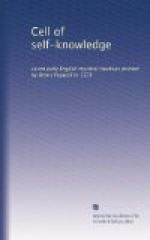To these thoughts, and to all such that would put us out of peace and restfulness of heart, we should none otherwise againstand,[290] but as we would the self fiend of hell, and as much we should flee therefrom as from the loss of our soul. No doubt but both the other two thoughts, of the spirit of the flesh and also of the spirit of the world, work and travail in all that they can to the loss of our soul, but most perilously the spirit of malice; for why, he is by himself, but they not without him. For if a man’s soul be never so clean of fleshly lust, and of vain joy of this world, and if it be defouled with this spirit of malice, of wrath, and of wickedness, not againstanding all the other cleanness before, yet it is losable. And if a soul be never so much defouled with the lust of the flesh, and vain joy of the world, and it may by grace keep it in peace and in restfulness of heart unto the even Christian,[291] though all it be full hard for to do (lasting the custom of the other two),[292] yet it is less losable, not againstanding all the other filth of the flesh and of the world touched before. And, therefore, though all that our lusty[293] thoughts of our flesh be evil, for they reave from the soul the life of devotion, and though all that the vain joy of the world be worse, for it reaveth us from the true joy that we should have in contemplation of heavenly things, ministered and taught to us by the angels of heaven. For who so lustily desireth to be worshipped, favoured, and served of men here in earth, they deserve to forego the worship, the favour, and service of angel in ghostly contemplation of heaven and of heavenly things, all their lifetime; the which contemplation is better and more worthy in itself than is the lust and the liking of devotion. And for this bitterness I




